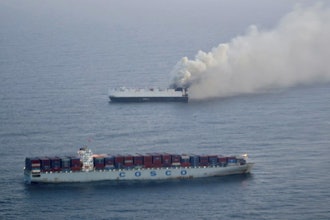MONTREAL (CP) -- Insolvent forestry giant AbitibiBowater says it is running "on fumes" and desperately needs a cash infusion from debtor financing, a bankruptcy court heard Friday.
A lawyer for the Montreal-based company told the Quebec court that the world's biggest newsprint company needs the proposed $100 million financing to provide it with a cash cushion to operate and meet its large payroll.
"The company is to a certain degree operating on fumes," he told Justice Clement Gascon of the Quebec Superior Court.
The Quebec government is proposing to guarantee a so-called debtor in possession, or DIP, emergency loan from Bank of Montreal.
However, a series of creditors are concerned that assets used to secure their debts own debts with AbitibiBowater will be usurped by the emergency funding.
But Fred Myers, who represents unsecured holders of $3 billion of debt, said the creditors are oversecured.
Court-appointed monitor Bob Thornton of Ernst & Young, said AbitibiBowater can survive through the weekend but noted its cash position "isn't ideal" for a company of its size.
The company, with nearly 16,000 employees around the world, goes through about $200 million monthly, court was told.
U.S. Bankruptcy Court has approved a separate US$200 million DIP financing for the Bowater subsidiary.
Gascon suggested Friday that approval of the Canadian funding will not come before Tuesday.
He will also rule on Monday on the union's request to require Abitibi to meet $68 million of contributions for enhanced early retirement under the company's pension fund.
Another judge will then hear a separate effort Monday on Abitibi's efforts to suspend contributions to the underfunded pension plan.
Gaetan Menard, secretary-treasurer of the Communications, Energy and Paperworkers Union, accused the company Friday of trying to renege on negotiated provisions to allow early retirement at age 57 for the company's workers.
"Employees have been paying higher premiums toward this goal, and to think that their investment could now go to pay off the banks is an outrage," Menard said in a release.
The Montreal newsprint producer filed for bankruptcy protection from creditors last month in Canada and the U.S., raising fears about the future of thousands of employees as the debt-laden company streamlines and tries to settle its US$6 billion in debts over the next several months.
Bankruptcy laws in Canada and the United States are designed to allow companies to continue operating while working with their creditors -- from lenders to suppliers to employees to governments -- under court supervision.
In Canada, Stelco, Air Canada, Algoma Steel and numerous other companies have restructured under such a process, but usually emerged smaller and with fewer employees.
AbitibiBowater faces trouble in its markets as demand for pulp, lumber, newsprint, other paper products and cardboard are all expected to be squeezed by the recession.
Meanwhile, deep structural changes in the newspaper industry as new delivery on the Internet grows continue to reduce overall demand.
In a document filed with the Delaware bankruptcy court, the company said it has about 15,800 active employees around the world, including about 11,268 in Canada and 3,920 in the United States.
About 11,600 of the employees are represented by unions, predominantly the CEP in Canada and the United Steelworkers in the United States.
AbitibiBowater shares have been suspended from trading on the Toronto Stock Exchange.
AbitibiBowater has already cut 4,000 jobs since the merger of predecessors Abitibi-Consolidated and Bowater Inc. in 2007, creating one of the world's largest paper producers.
Last year, the company announced the shutdown of a century-old paper mill in Grand Falls, Nfld., cutting more than 800 jobs, as part of an earlier round of streamlining to deal with excess capacity and lower demand.
The Newfoundland and Labrador government has taken over the hydroelectric power plant at the mill after passing a law to expropriate the assets and water and timber rights, despite the company's objections and threat of a challenge under the North American Free Trade Agreement.
AbitibiBowater has said it will be business as usual during the restructuring for the company, which operates 23 pulp and paper and 30 wood products mills in Canada, the United States, the United Kingdom and South Korea.
The troubles at AbitibiBowater mirror problems at other iconic Canadian forestry companies such as Tembec and Domtar as the industry faces a global drop in demand for paper, a steep decline in the lumber market, mill closures and thousands of layoffs that have battered mill towns across Canada.














![7 001[1]](https://img.manufacturing.net/mindful/im/workspaces/default/uploads/2025/06/7-0011.S7Uqlbb3HV.jpg?auto=format%2Ccompress&crop=focalpoint&fit=crop&fp-x=0.53&fp-y=0.44&h=220&q=70&w=330)






